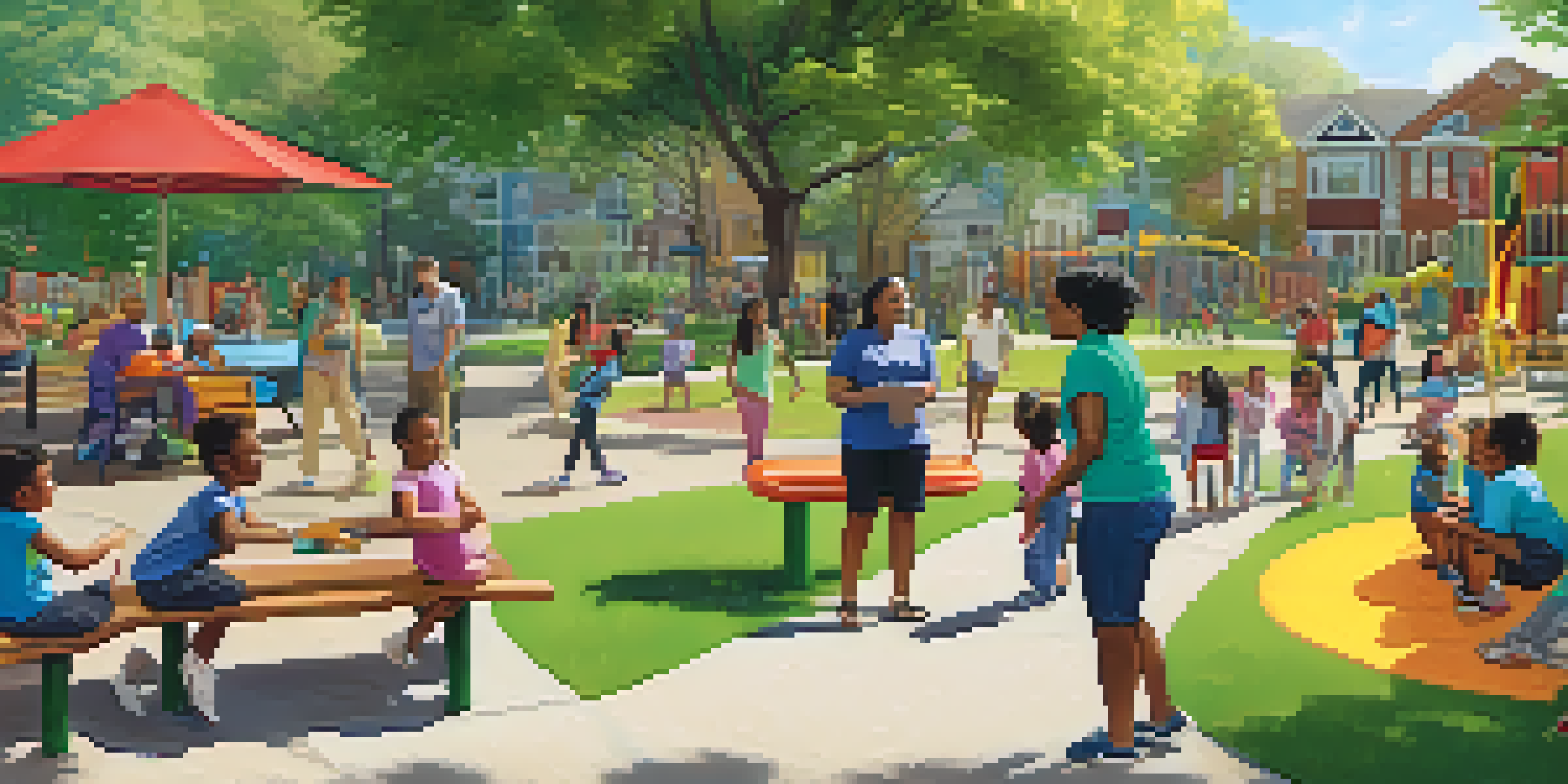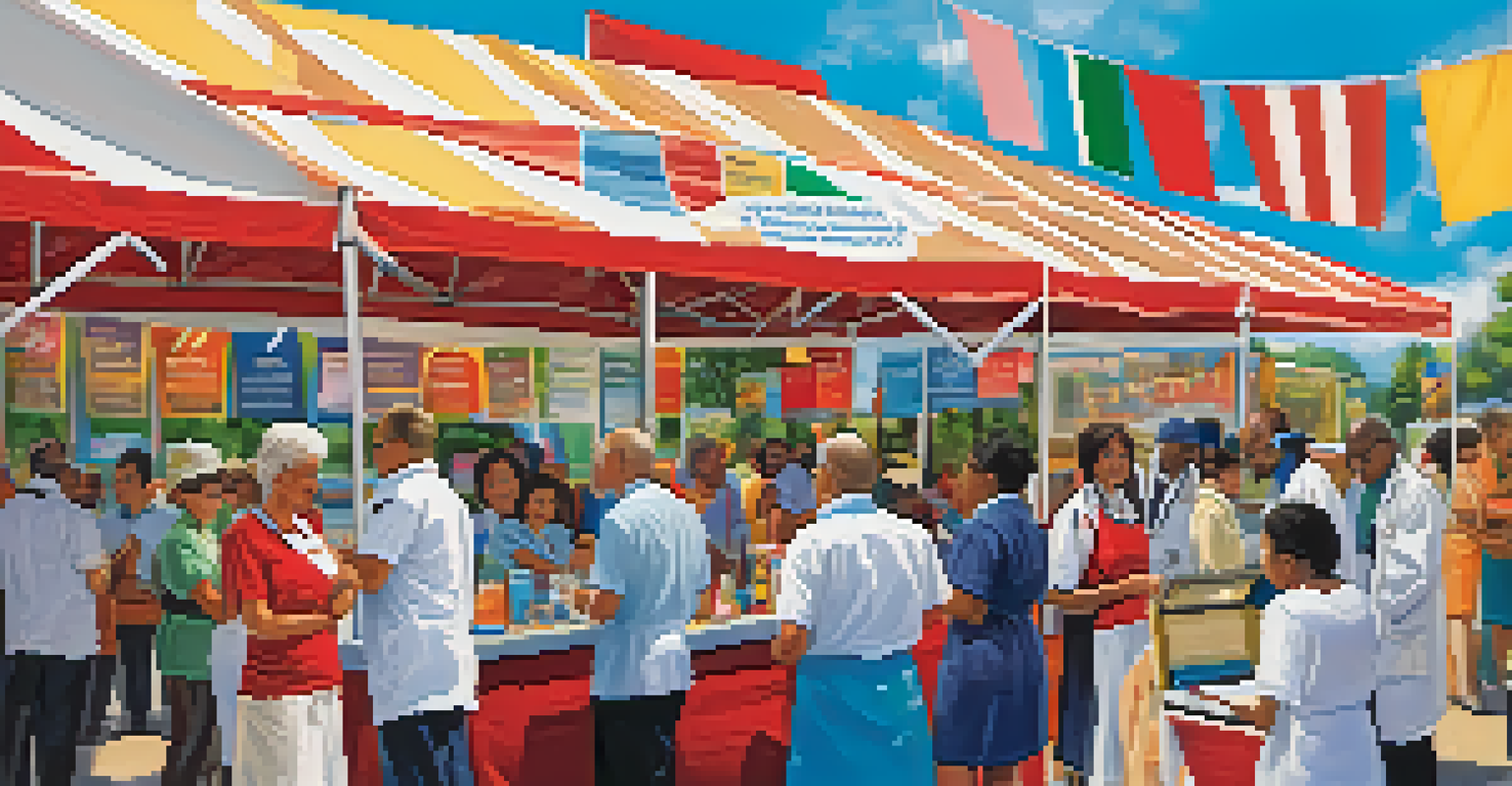Community Health Workers: Bridging Gaps in Healthcare Access

Understanding the Role of Community Health Workers
Community Health Workers (CHWs) serve as vital links between healthcare systems and the communities they serve. They often hail from the communities they work in, which allows them to understand the unique challenges and needs of their neighbors. By providing culturally competent care and support, CHWs help bridge gaps that often leave underserved populations without adequate healthcare.
The best way to find yourself is to lose yourself in the service of others.
The role of CHWs is multifaceted, encompassing education, advocacy, and support. They educate community members about health issues, preventive care, and available services, empowering individuals to take control of their health. This grassroots approach fosters trust and encourages individuals to seek care when they need it, ultimately leading to better health outcomes.
Additionally, CHWs often assist with navigating complex healthcare systems, helping people schedule appointments, understand insurance, and access resources. Their presence in the community not only improves healthcare access but also builds relationships that encourage ongoing engagement with health services.
The Importance of Culturally Competent Care
Culturally competent care is essential in delivering effective healthcare, particularly in diverse communities. CHWs are uniquely positioned to provide this type of care because they share cultural backgrounds with the individuals they serve. This shared understanding fosters a sense of trust and makes it easier for community members to communicate their health concerns.

For instance, a CHW may provide information about healthy eating in a way that respects traditional diets and local food availability. This tailored approach not only makes health education more relatable but also encourages individuals to make sustainable lifestyle changes. When healthcare is culturally relevant, it resonates more with patients, leading to better adherence to treatment plans.
CHWs Bridge Healthcare Gaps
Community Health Workers (CHWs) connect underserved populations to healthcare by providing education, support, and navigation services.
Ultimately, culturally competent care reduces disparities in health outcomes, as it addresses barriers that may prevent individuals from accessing necessary healthcare. CHWs play a crucial role in ensuring that everyone receives the care they need, regardless of their background.
Addressing Social Determinants of Health
Social determinants of health, like income, education, and environment, significantly influence health outcomes. CHWs are often on the front lines, identifying these determinants within their communities and advocating for change. By addressing these underlying factors, CHWs help create healthier environments where individuals can thrive.
Health is a human right, not a privilege to be purchased.
For example, if a community lacks access to fresh produce, a CHW might collaborate with local organizations to establish a community garden or farmers' market. This initiative not only improves access to nutritious food but also fosters community engagement and education about healthy eating. Addressing social determinants like this can have a ripple effect on overall community health.
By tackling the root causes of health disparities, CHWs empower communities to advocate for their own needs. Their holistic approach ensures that health initiatives consider the broader context of individuals' lives, promoting long-term health improvements.
Improving Health Literacy in Communities
Health literacy is the ability to obtain, process, and understand basic health information. Many individuals struggle with health literacy, leading to confusion and miscommunication with healthcare providers. CHWs play a pivotal role in enhancing health literacy by simplifying complex medical information and making it accessible to community members.
Through workshops, one-on-one sessions, and community events, CHWs teach essential health concepts, such as understanding prescriptions, recognizing symptoms, and navigating insurance plans. This empowerment enables individuals to make informed decisions about their health and seek care when necessary. Improved health literacy leads to better health management and outcomes.
Culturally Competent Care Matters
CHWs deliver culturally relevant health education, fostering trust and encouraging individuals to engage with healthcare services.
Moreover, when community members feel more confident in their understanding of health information, they are more likely to engage proactively with healthcare systems. CHWs foster this confidence by creating an environment where questions are welcomed, and learning is encouraged.
Expanding Access to Preventive Care Services
Preventive care is vital for early detection and management of health issues, yet many people often overlook it. CHWs help raise awareness about the importance of preventive services, such as vaccinations, screenings, and regular check-ups. They encourage community members to prioritize their health and take advantage of available resources.
By organizing health fairs, free screenings, and informational sessions, CHWs make preventive care more accessible. They often collaborate with local health providers to offer services directly in the community, reducing the barriers of transportation and cost. This proactive approach can significantly increase the number of individuals receiving preventive care.
Furthermore, CHWs follow up with individuals to ensure they understand the results of screenings and any recommended follow-up care. This continuity of care reinforces the importance of preventive services and helps individuals stay engaged in their health journey.
Building Trust Between Communities and Healthcare Providers
Trust is a vital component of effective healthcare, yet it is often lacking in underserved communities. CHWs serve as a bridge to build this trust, acting as advocates for community members while also facilitating communication with healthcare providers. Their presence reassures individuals that they can seek care without judgment or misunderstanding.
By sharing personal stories and experiences, CHWs help demystify healthcare processes and alleviate fears. They encourage open dialogue between community members and providers, fostering a collaborative approach to health. When trust is established, individuals are more likely to seek and adhere to medical advice.
Addressing Health Disparities
By focusing on social determinants of health, CHWs empower communities to advocate for their needs and promote healthier environments.
Ultimately, this trust leads to improved health outcomes, as individuals feel more comfortable discussing their health concerns and seeking necessary care. CHWs play a crucial role in nurturing this trust, ensuring that healthcare is a partnership rather than a transactional experience.
The Future of Community Health Workers in Healthcare
As the healthcare landscape continues to evolve, the role of Community Health Workers is becoming increasingly important. With growing recognition of their contributions, many healthcare systems are integrating CHWs into their teams. This shift highlights a commitment to addressing health disparities and enhancing access to care.
Future initiatives may focus on expanding training programs for CHWs, equipping them with the skills needed to address emerging health challenges. Additionally, leveraging technology can enhance their impact, allowing them to reach more individuals and provide virtual support. This adaptability ensures that CHWs remain relevant and effective in diverse healthcare settings.

Moreover, as policymakers recognize the value of CHWs, we may see increased funding and resources directed toward community health initiatives. This investment not only supports the work of CHWs but also strengthens the communities they serve, paving the way for a healthier future.